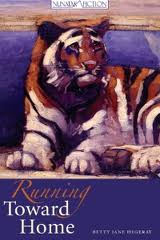 I’m not usually a souvenir-type person, unless you count my collection of autographed books from each writer’s conference I’ve attended. After Betty Jane Hegerat’s workshop at the 2009 ICWF WorDshop, I made a beeline for the book table. I wanted the book she’d talked about, the one where she’d gotten permission from the Calgary Zoo to hang out there for a night so she’d be able to describe the setting of her story accurately.
I’m not usually a souvenir-type person, unless you count my collection of autographed books from each writer’s conference I’ve attended. After Betty Jane Hegerat’s workshop at the 2009 ICWF WorDshop, I made a beeline for the book table. I wanted the book she’d talked about, the one where she’d gotten permission from the Calgary Zoo to hang out there for a night so she’d be able to describe the setting of her story accurately.
And while getting her to sign the book, I had the chance to chat with her about the creative writing graduate program at UBC. Soon after I got home, I cracked open Running Toward Home. I wanted to see what sort of book a person with a master’s degree in creative writing wrote.
A very good book, as it turns out. This is a book that I want to read again and again, in the hopes that something of Betty Jane’s skill with words will rub off on me. Betty Jane grabs the reader with the first few lines of Running Toward Home. Her characters are raw and genuine; some readers may be shocked by the bad language used, but the language suits the characters. The chapters are short, jumping between each character’s perspective, giving a kaleidoscope image of the story and keeping the action moving.
Corey is a twelve-year-old foster kid on his bi-annual visit to the Calgary Zoo with his mother, Tina. She’s twenty-six, jobless, and broke, and has just gotten a surprise visit from her jailbird boyfriend—who isn’t allowed to be around Corey since putting Corey in the hospital with multiple injuries. Torn between her son and her boyfriend, Tina tries to make both happy and ends up leaving Corey at the Zoo—overnight. There, he fights his fever and his memories while deciding what to do.
Wilma is Corey’s foster mom, a middle-aged average housewife whose two sons have grown up and moved out. She and her husband Ben heard about Corey from friends of theirs, Corey’s former foster family, when he was being sent back for running again. They want to give Corey a second chance, but chances may have run out, because Corey’s new social worker seems bent on sending Corey into a group home. When Wilma and Ben find out that Corey is missing, the race is on to find him before social services does.
The entire story happens in less than twenty-four hours, with the feeling that each minute, each thought, each choice counts for each character. Bit by bit in the novel, Betty Jane reveals the complex motivations of the characters as well as the ways that their pasts have shaped them. In the end, she wraps up Running Toward Home with a touching and yet real ending, leaving readers hoping for the best for these characters they’ve come to love.
Betty Jane says she is “an Alberta writer with a deep love of the landscape of that province, both urban and rural, and gratitude for the small town origin that has given her the conviction that there are no ‘ordinary’ lives.” This shows up in the way the entire story is set in her native Alberta, in a landmark for Albertans. She also shows how the characters in her story impact each other and, in their own “ordinary” lives, are extraordinary.
Betty Jane’s experience as a social worker and her master’s degree in social work give impetus for the story. The book is dedicated to “children in care and the foster parents and social workers who keep them safe.”
This post contains affiliate links; as an Amazon Associate, I earn from qualifying purchases. I bought this book but enjoyed it so much I wanted to share it with you.

No Responses Yet